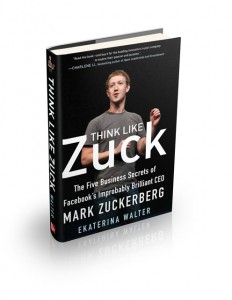 One in every five page views on the Internet is a Facebook page. With over 1 billion users, it is the world’s largest global social media site. So how did Facebook grow so large in only nine years, and what can other businesses learn from CEO Mark Zuckerberg’s phenomenal success? I discuss the answers to these questions in more detail in my book “Think Like Zuck: The Five Business Secrets of Facebook’s Improbably Brilliant CEO Mark Zuckerberg,” but in this post I wanted to share some quick insights around the five key elements of success.
One in every five page views on the Internet is a Facebook page. With over 1 billion users, it is the world’s largest global social media site. So how did Facebook grow so large in only nine years, and what can other businesses learn from CEO Mark Zuckerberg’s phenomenal success? I discuss the answers to these questions in more detail in my book “Think Like Zuck: The Five Business Secrets of Facebook’s Improbably Brilliant CEO Mark Zuckerberg,” but in this post I wanted to share some quick insights around the five key elements of success.
1. Passion
In the “About Mark” section of his personal Facebook profile it simply states, “I’m trying to make the world a more open place.” That is Zuckerberg’s passion, his absolute driving principle: He is dedicated to connecting people and helping them share information.
This same passion is seen in the most successful companies: Apple is passionate about simple, elegant design that is intuitive to use; Dyson is passionate about taking existing designs and making them better (“I just want things to work properly”); Virgin believes in going the extra mile for its customers.
Passion is what turns an entrepreneur into a successful business leader: If you are driven by passion you won’t give up, no matter how long the journey.
2. Purpose
Facebook was not the first social network; Apple did not invent the mp3 player. What these hugely successful companies do differently is take ideas one step further than everyone else, to imagine a new way of doing things. Successful companies have a clearly defined purpose: why they do what they do. And they have leadership that leads with purpose with courage to stay the course.
Great companies don’t just create great products, they create movements.
Southwest Airlines believe in affordable air travel with an enthusiastic, dedicated staff. They have huge customer loyalty in a time when their competitors are suffering from declining revenues and customer dissatisfaction. Their purpose is to provide great customer service, and this mission is built into every level of the company.
No matter how big Facebook grows, its vision – to connect people and make the world more open and transparent – remains the same.
3. People
“The success of Facebook is really all about the team that we’ve built.” – Mark Zuckerberg
As companies grow, so does the likelihood that their staff will become more disengaged from the company’s core values. So how does Facebook maintain the “hacker culture” (fast-moving, always testing the boundaries) they have become so famous for?
Facebook’s hiring procedures are notoriously tough because they want to build a team who live and breathe the hacker way. They regularly hold all-night hackerthons, and these have been responsible for some of the most innovative Facebook features. A flat management structure and a culture that empowers employees to take risks are keys to cementing the hacker way in at every level.
Hire for attitude. Skills can be taught, passion – can’t.
4. Product
Facebook is utterly committed to its product. Every innovation is to further its goal of connecting people in the simplest way possible. Facebook’s philosophy is to “move fast and break things,” and this has ensured the rapid growth that has allowed them to dominate social media – and beyond, pushing Facebook integration into more and more external sites.
Zuckerberg’s complete belief in his product has given him the strength to persevere with some of the most unpopular changes in the face of huge opposition, even within his own company.
Build what you believe in.
5. Partnerships
In business, building the right partnerships is often key to success. They might be the founding partnership, finding the right supplier or distributor, or the right investors for your product.
At Facebook, Mark Zuckerberg provides the imagination while Sheryl Sandberg, Chief Operating Officer, provides the execution. “Sheryl has been my partner in running Facebook and has been central to our growth and success over the years,” says Zuckerberg.
Like the Warner brothers, Hewlett and Packard, Ben Cohen and Jerry Greenfield or any other successful business partnerships, the Zuckerberg – Sandberg duo shares the same values, complementary strengths, commitment, mutual trust and the mutual respect needed to continue to drive the company forward.
To sum up:
Zuckerberg’s desire for a more connected world has fueled Facebook’s staggering growth and changed the way we interact on a global level, even the way we are using the Internet. To me, “Think Like Zuck” is an analogy of a leader who follows his passion, leads with purpose, builds great teams, and strives for continued excellence in products (or services). It is a mentality that drives great leaders to build successful businesses and the approach they use to do so.
So what do you think? Does this make sense for your business? We would love to hear from you in the comments below.

